Newsletter 2021/3
September 2021
Introduction
While the COVID-19 pandemic still presents formidable challenges, the summer newsletter comes at a time when the global vaccination rate continues to increase, gradually enabling in-person activities to take place with due regard to health and safety measures.
The next few months will see a variety of activities occurring at the premises of the Tribunal. In this regard, September brings the Judges together for the Tribunal’s fifty-second administrative session, their first in-person meeting since March 2020. The last two sessions, in October 2020 and March 2021, were held in hybrid format. During administrative sessions, the Tribunal deals with legal and judicial matters as well as organizational and administrative matters.
The first of October marks the twenty-fifth anniversary of the Tribunal. Our original plan was to hold a conference to celebrate this important milestone, but in light of the ongoing restrictions posed by the COVID-19 pandemic, it was decided to postpone the conference to 2022. Instead, there will be a small ceremony to mark the occasion with the Judges, the First Mayor of Hamburg and representatives of the diplomatic and consular corps in attendance. I will give an address via live video conference on that day and we will release an updated version of the Tribunal’s Digest of Jurisprudence as well as a short film on the 25 years of the Tribunal. A section of the Tribunal’s website will also be dedicated to the anniversary and I encourage you to join us in celebrating the occasion online.
In November, the first “ITLOS Workshop for Legal Advisers (sponsored by the Republic of Korea)” will take place at the Tribunal. This first workshop will bring together the legal advisers of States from South East Asia and the Pacific Small Island Developing States for a week-long programme dedicated to the procedures for the peaceful settlement of disputes related to the law of the sea, as enshrined in the United Nations Convention on the Law of the Sea (“UNCLOS” or “the Convention”). Lectures will also be given on substantive matters concerning the law of the sea.
Turning to the judicial work of the Tribunal, the written phase in the Dispute concerning delimitation of the maritime boundary between Mauritius and Maldives in the Indian Ocean (Mauritius/Maldives) is ongoing and the Counter-Memorial of Maldives is expected later this year. In M/T “San Padre Pio” (No. 2) Case (Switzerland/Nigeria), by Order dated 10 August 2021, the opening of the oral proceedings has been postponed until a later date to be fixed after consultations with the Parties.
As for the Tribunal’s work in the area of capacity building, the start of August saw the opening of the 2021/2022 ITLOS-Nippon Foundation capacity-building and training programme on dispute settlement under UNCLOS. I am pleased to welcome the next group of successful candidates to the Tribunal and I trust that our seven new fellows will seize the opportunity for learning and debate offered by the expert faculty of judges, professors and practitioners. Although it was not possible for the International Foundation for the Law of the Sea (“IFLOS”) to organize its fourteenth Summer Academy as an in-person event, a week-long online law of the sea and maritime law course was offered to this year’s Summer Academy participants. It was my pleasure to deliver a lecture on “UNCLOS as the ‘Constitution for the oceans’” and I thoroughly enjoyed the interaction with the participants.
The effective operation of the Convention is tied to the robust system of dispute settlement enshrined in its Part XV and, in this twenty-fifth year of the institution’s existence, I wish to emphasize that the Tribunal, as the sole permanent judicial body created by the Convention, remains committed to ensuring the peaceful settlement of disputes concerning the interpretation and application of the Convention.
I hope that you enjoy reading the newsletter.
With my warmest regards,
Albert Hoffmann
President
ITLOS Cases
The written phase is currently ongoing and the Counter-Memorial of Maldives is expected by 25 November 2021.
Case No. 29: The M/T “San Padre Pio” (No. 2) Case (Switzerland/Nigeria)
By Order of 2021/4, the views of the Parties having been sought, the opening of the oral proceedings has been postponed until a later date to be fixed after consultations with the Parties.
Feature article with Judge Ida Caracciolo (Italy)
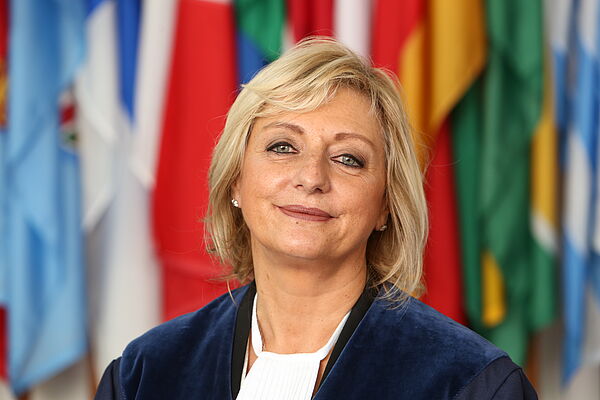
Challenges imposed by COVID-19 on the law of the sea and international maritime law
In the past, ships were large-scale carriers of infectious diseases, contributing to the spread of numerous epidemics over the centuries. Although in all likelihood the COVID-19 pandemic has not been spread by maritime shipping, a number of outbreaks of the virus have occurred onboard ships, some of which reached alarming proportions, to the extent that the attention of the media of the entire world was attracted.
Faced with the risk of COVID-19 being spread by maritime shipping, several States reacted by adopting measures for protecting public health, such as: placing crews and passengers in quarantine for certain periods; restricting loading and unloading of cargo, embarkation and disembarkation of crews and passengers, and the taking onboard of fuel, water and stores; limiting or completely prohibiting crew changes; and even refusing foreign vessels to access ports. These measures caused doubts to be raised as concerns their compatibility with the law of the sea and international maritime law.
It is certainly the case that ports, which are also classed as coastal States’ internal waters, are subject to the sovereignty of the State and its domestic law in the same way as the land, excepting the limits provided by international law. Coastal States are therefore free to decide whether or not to allow certain vessels to enter their ports, although the great majority of maritime ports are open to foreign merchant ships since States have an interest in benefiting from the advantages of international trade. At all events, access to foreign ports, even without the consent of the coastal State, is permissible for vessels in distress in order to take refuge therein. When it is a matter of protecting human life at sea, it may be borne in mind that the interest in protecting the ship in distress takes precedence over the coastal State’s concern to safeguard its waters.
The sovereignty of port States may encounter further limits in international treaties on the protection of the health of crews and travellers onboard vessels and on the protection of seafarers’ rights.
For example, the International Health Regulations, adopted in 1969 by the World Health Organization and revised in 2005, provides that States parties should not only ensure that some of their ports are secure from the point of view of travellers’ health, but should also issue health certificates for vessels specifying that they are in conformity with the maritime health and quarantine rules set out in the Regulations. In specific conditions, the port State cannot refuse foreign vessels access to a port in order to protect public health. Similarly, foreign vessels cannot be refused free pratique to embark or disembark people, unload or load goods or take onboard fuel, water or stores if there is no threat of the vessel’s facilitating the spread of a disease.
The 2006 Maritime Labour Convention contains well-defined obligations for contracting States as concerns seafarers’ health. In particular, it requires the flag State to ensure that adequate measures are in place to protect the health of seafarers onboard its ships and that they have rapid and adequate access to medical care while they are working. The port State must ensure that seafarers onboard its ships located in its internal waters and who are in need of immediate medical care have access to medical services ashore. The Convention also sets out the seafarers’ right to return at no charge to their country of residence provided certain circumstances and conditions are met.
In the face of the so-called “crew crisis” during the COVID-19 pandemic, in 2020 the Committee of Experts on the Application of Conventions and Recommendations of the International Labour Organization adopted comments on the respecting of the 2006 Convention. The Committee first considered that it appeared difficult for a possible act of God to result in the absolute and genuine impossibility of fulfilling the obligations viz-à-viz seafarers, including those of the Convention, for a long period of ten months’ duration. The Committee also stressed that circumstances rendering respect for an international obligation more difficult or more burdensome did not amount to an act of God. Finally, the Committee expressed its doubts as to the temporary suspension of the Convention since it does not contain any provisions allowing its implementation to be temporarily suspended in case of health or other crises. Furthermore, the Committee considers that it is precisely in times of crisis that the protection of seafarers is paramount and should be applied as assiduously as possible, particularly since the Convention contains only minimal standards for the protection of seafarers’ rights.
The Maritime Safety Committee of the International Maritime Organization (“IMO”) also addressed the “crew crisis”, adopting several resolutions in this regard. More precisely, with resolution MSC 473(ES.2) of 21 September 2020, the Committee requested Member States to designate seafarers as key-workers providing essential services, so as to facilitate crew changes safely and unhindered, and to foresee the possibility, from the legal aspect, of drafting documents enabling such status to be established for their embarkation and disembarkation. Designating seafarers as key workers is essential in order to exempt them from travel restrictions adopted by States owing to the pandemic, enabling them to travel between their State of residence and vessels, and to be repatriated at the end of their contracts. The IMO’s call was taken up by the United Nations General Assembly which, in resolution 75/17 of 1 December 2020, called upon States and vessel operators to cooperate in order to address the challenges faced by crews, and urged States to follow up on the IMO’s proposals.
In the final analysis, COVID-19 has given rise to a sort of suspension or easing of certain international maritime cooperation obligations. However, cooperation of this nature can play a highly important role in urgent situations where coordination between the flag State, the port State and the State of nationality of passengers and crews is essential for ensuring the proper flow of maritime traffic and respect for the various interests at stake, including the protection of human rights.
Capacity Building
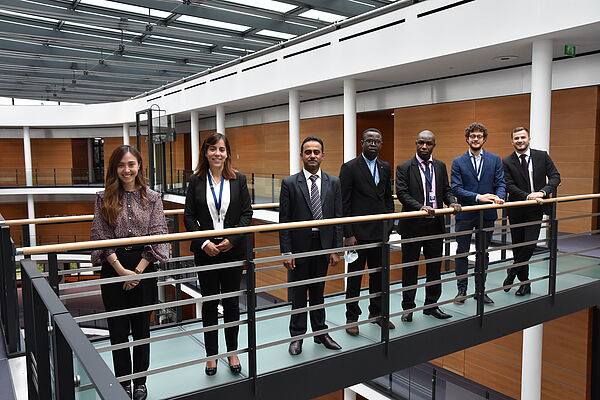
ITLOS-Nippon capacity-building and training programme on dispute settlement under UNCLOS
Following a successful application process, Ms Vanessa Arellano Rodríguez (Ecuador), Mr Egor Fedorov (Russian Federation), Mr Essohanam Kadanga Kao (Togo), Mr Andrea Longo (Italy), Mr Uddav Neupane (Nepal), Mr Abdou Aziz Saho (The Gambia), and Ms Maria Juliana Tenorio Quintero (Colombia) were selected to participate in the 2021/2022 ITLOS-Nippon Foundation fellowship.
The seven fellows have thus far participated in the online IFLOS Summer Academy and have already attended lectures on various aspects of the Tribunal’s jurisdiction and procedures before it as well as on advisory proceedings. Over the course of the nine-month programme, the fellows will complete modules dedicated to: dispute settlement under the Convention; bringing a case to the Tribunal; maritime delimitation and practical skills; the jurisprudence of the Tribunal; environmental law; maritime law; institutions established under the Convention and other relevant organizations; and current issues in the law of the sea. Throughout the programme, the fellows will follow a series of lectures, workshops and training sessions, and will also participate in organized study visits. We look forward to accompanying the fellows on their journey.
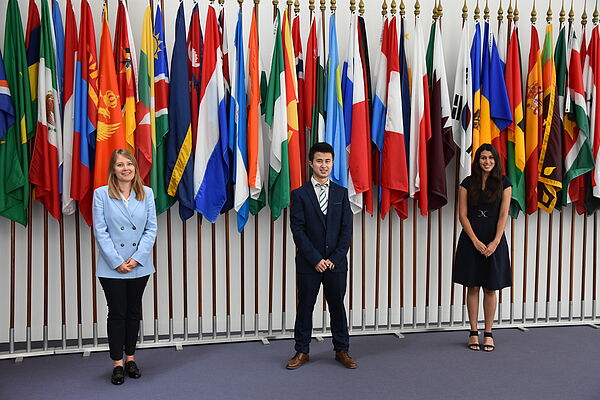
Internship programme
The internships of Sarah-Marie Thomas (Germany) and Michail Michailides (Cyprus) came to an end in June, with the presentation of their research on “The European Union’s current role in environmental protection in the Arctic” and “Critical assessment of the South China Sea maritime disputes over natural resources under international law: Recent developments and the 2021 Chinese coast guard law”, respectively. Since then, Ms Sabrina Devereaux (USA), Ms Olesia Gorbun (Ukraine) and Mr Ke Song (China) have started their internships in the Legal Office.
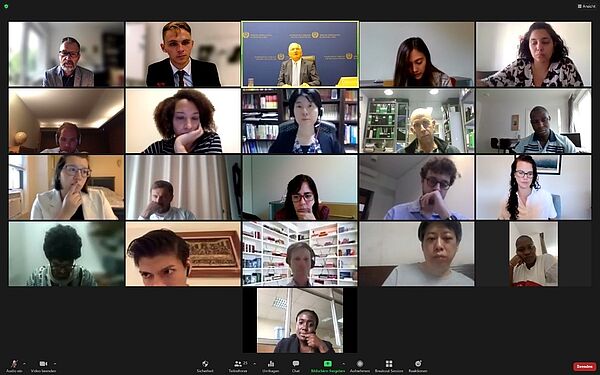
IFLOS Summer Academy
The fourteenth IFLOS Summer Academy took place online from 16 to 20 August 2021. Covering aspects related to the law of the sea and maritime law, lecturers in the online programme included President Hoffmann, Vice-President Heidar, and Judges Attard and Caracciolo.
Alumni network
The alumni network continues to grow and we are happy that the conversations and presentations series are effective in bringing together alumni from all over the world to discuss their professional experience and research interests in the law of the sea. The past three months have witnessed several conversations on the work of ITLOS alumni in the fields of shipping, environmental protection and communications within the United Nations Office for Project Services. Recent presentations have also been given by: Bruno Arpi, “The challenges to the Antarctic Treaty System in the early 21st century”; Adonis Tafangy, “Madagascar’s maritime zones: Overview, challenges and perspectives”; Nong Hong, “Ocean governance in the South China Sea: A review on law, policy and management”; and Nicholas Ioannides on the “Rights and obligations of States in undelimited maritime areas”.
Meet the ITLOS Alumni
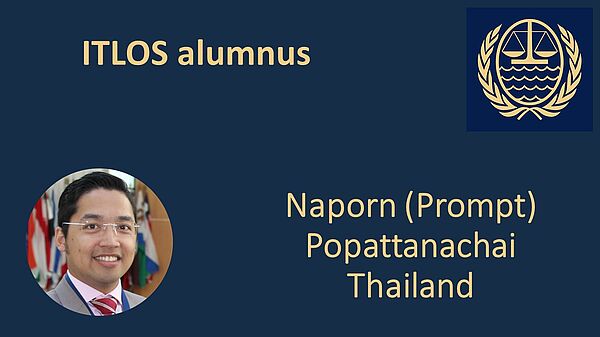
Dr Naporn (Prompt) Popattanachai (Thailand), ITLOS-Nippon Fellow in 2016/2017, Assistant Professor in International Law, Faculty of Law, Thammasat University, Thailand
My time with ITLOS was quite a journey, involving attendance at two editions of the IFLOS Summer Academy and participation in the ITLOS-Nippon fellowship. One day during my extraordinarily wet summer in Scotland, I was surfing the cyber world and was struck by the ITLOS website. That is where the journey began. I applied to the Summer Academy and was offered a place to be a part of the IFLOS family with the generous scholarship provided by the Foundation. It was a wonderful time. Two years later, I returned to Hamburg for the ITLOS-Nippon fellowship, which enabled me not only to participate in the Academy again, but also allowed me to make exhaustive use of the Tribunal’s Library and to complete my PhD thesis. Looking back, I could not thank the Tribunal enough for the resources I was provided with in order to successfully undertake my research. On top of that, it should be noted that I also had a chance to be a part of the ITLOS running team (captained by the former Registrar) and to finish the Paris Marathon in 2017. It is not that difficult to guess how exciting and exhausting my time at the Tribunal was, right?
My time at the Tribunal was truly precious. The knowledge gained and training provided at that time are still very important and indeed useful to my work at the University – both teaching and researching. For someone whose interests lie somewhere other than international dispute resolution, witnessing The M/V “Norstar” Case (Panama v. Italy) and the Dispute concerning delimitation of the maritime boundary between Ghana and Côte d'Ivoire in the Atlantic Ocean (Ghana/Côte d'Ivoire) opened my eyes and made me a big fan of the dispute- settlement mechanism provided by UNCLOS. Together with the encouragement given by the current Registrar, Ms Ximena Hinrichs Oyarce, who was my supervisor at the time, I was able to gain confidence in studying, researching and now teaching Part XV of the Convention with ease. A big plus to this very precious time was that I was able to foster important relationships with other brilliant ITLOS-Nippon fellows and interns, including Ines Aguiar Branco, who had been there with me since 2016 and also followed the ITLOS-Nippon programme at the same time as I did. I could not ask for any better experience.
The chance to meet so many people involved in the law of the sea – academics and professionals – at the Tribunal allowed me to venture onto the seas and oceans myself happily and easily. Now at the Faculty of Law, Thammasat University, Thailand, I am delivering classes on public international law, international environmental law, and international law of the sea, which all draw on my experience at the Tribunal. I always mention the internship, the Summer Academy and the fellowship to my students, hoping that this will fascinate the younger generation and inspire them to work in the law of the sea. In the near future, some of my students will hopefully join this wonderful family. On the research side, I have been working on the protection of the marine environment from land-based sources and activities, and the current focus of my research is on plastic pollution. Together with Professor Elizabeth Kirk (my PhD supervisor), we are now editing a handbook on this very matter, hoping to help make the seas and oceans cleaner, better and safer for all.
For the past year, it has been clear that the COVID-19 pandemic has barred us physically. However, as this gradually fades away, I sincerely hope that all ITLOS alumni will have an opportunity to reconnect and meet physically.
Upcoming Events
The next administrative session of the Tribunal is being held from 20 September to 1 October 2021.
The next IFLOS Maritime Talks, an online event, is being held on 25 September 2021 on the topic “Port law: Current issues and legal challenges”. Information may be found here.
The Tribunal’s twenty-fifth anniversary will be celebrated on 1 October 2021.
The ITLOS Workshop for Legal Advisers (sponsored by the Republic of Korea) will be held from 7 to 12 November 2021.

